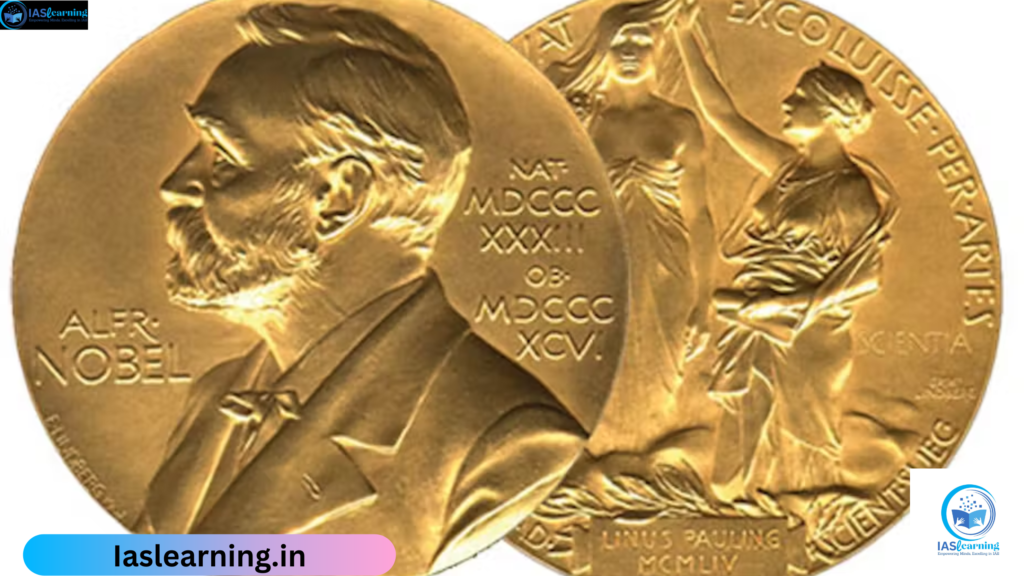In accordance with his 1895 will, Alfred Nobel founded the Nobel Prizes, which are awarded to “those who, during the preceding year, have conferred the greatest benefit to humankind.” Since 1901, the Nobel Prize has been awarded virtually annually for the fields of physics, chemistry, physiology/medicine, literature, and peace. The Sweden’s central bank, Sveriges Riksbank, founded the Sveriges Riksbank Prize in Economic Sciences in 1968 in honor of Alfred Nobel. The prize has been awarded annually since then.
The Man behind Nobel Prize
Alfred Nobel was a businessman chemist, engineer, inventor, and the man who created the Nobel Prize. He passed away in San Remo, Italy, on December 10, 1896, after been born in Stockholm, Sweden, on October 21, 1833.
- In his final will and testament, Nobel directed that the majority of his property belong to a fund, with yearly awards to be distributed from the fund’s interest.
- Using nitroglycerin, Nobel’s most well-known innovation was dynamite, which he patented in 1867.
- He became well-known around the globe after the St. Gotthard Tunnel in the Swiss Alps was completed in 1881 and dynamite was employed widely for the first time.
- He held 355 patents in all, including ones for smokeless gunpowder and blasting caps.
- His inventions were used by more than 90 factories worldwide to make explosives of all kinds, and more than 20 nations have Nobel firms.

For more : What is the concept of Nation and State?
What is Constitutionalism And Consitutional Morality
Nobel Prize Award Process
The primary distinction between all Nobel Prize selection processes is who is eligible to submit a nomination.
Stage-1: Nomination Process
Approximately 3,000 individuals get nomination forms from the Nobel Committee each year in September, the month before the prizes are announced.
- These are usually well-known scholars who are engaged in pertinent work.
- Questions about the Peace Prize are posed to governments, past recipients of the award, and present or previous members of the Norwegian Nobel Committee.
- The deadline for returning the nomination forms is January 31st of the award year.
- The Nobel Committee chooses over 300 nominees for the prize from these nomination forms as well as other names.
- The nominees’ identities are kept a secret, as is the knowledge that they are in the running for the prize.
- All nomination records are sealed for 50 years following the awarding of a prize.
Stage-2: Selection Process
After then, the Nobel Committee compiles a report that includes the suggestions of subject-matter experts. Along with the preliminary candidate list, this is given to the prize-awarding organizations.
- Four organizations are responsible for awarding the six prizes:
- Royal Swedish Academy of Sciences – Chemistry; Physics; Economic Science
- Nobel Assembly at the Karolinska Institute – Physiology / Medicine
- Swedish Academy – Literature
- Norwegian Nobel Committee – Peace
- The institutions choose the laureate or laureates in each field by majority voting.
- Following the voting, their verdict is made public right away and cannot be contested.
- For each prize, up to three laureates and two different works may be selected.
- With the exception of the Peace Prize, which can go to institutions, the prizes can only be granted to people.
- The granting bodies declare the winners in the first two weeks of October.
Stage-3: Award Ceremonies
Due to Alfred Nobel’s death anniversary, December 10 is also known as “Nobel Day” and is the day of the award ceremonies.
- Sweden’s Stockholm Concert Hall hosts the Nobel Prize presentation.
- The Nobel Prizes in physiology or medicine, chemistry, economic sciences, literature, and physics are awarded here.
- The Norwegian Nobel Committee bestows the Nobel Prize in Peace, with an award ceremony held in Oslo.
Important Recipients of Nobel Prize
| Nobel Laureates | Description |
Albert Einstein | – Albert Einstein received the Physics Nobel Prize in 1921. – His discovery of the “photoelectric effect,” or the ability of metallic atoms, when exposed to light, to eject electrons, earned him the prize. |
Marie Curie | – Marie Curie is the only person to have won a Nobel Prize in two different sciences. She was also the first woman to win this prestigious award.- She received the Nobel Prize in Physics in 1903 for her research on radioactivity, a phenomenon discovered by Henri Becquerel, and the Nobel Prize in Chemistry in 1911 for the discovery of radium and polonium and for isolating pure radium. |
Linus Pauling | – For his study of the chemical bond and its application to the structure of complex substances, Linus Pauling received the 1954 Nobel Prize in Chemistry. – Pauling became the only winner of two unshared Nobel Prizes in 1962 after receiving the Nobel Peace Prize for his activism against nuclear weapons. |
John Bardeen | – In 1956 for developing the transistor and again in 1972 for his work on the theory of superconductivity, John Bardeen won the Nobel Prize in Physics twice. |
International Committee of the Red Cross | – The Red Cross has received the Nobel Peace Prize three times, 1917, 1944, and 1963. The first two were given due to its efforts in the two world wars.In 1963, it was the 100th anniversary of the foundation of ICRC by Henry Durant. Durant himself won the Nobel Peace Prize in 1901. |
United Nations High Commissioner for Refugee | – For helping refugees, the UNHCR has received the Nobel Peace Prize twice, in 1954 and 1981. |
Dalai Lama | – The 14th Dalai Lama (Tenzin Gyatso) received the Nobel Peace Prize in 1989 “for promoting peaceful solutions based upon tolerance and mutual respect in order to preserve his people’s historical and cultural heritage.” |
Nelson Mandela | – Nelson Mandela and Frederik Willem de Klerk shared the Nobel Peace Prize in 1993 in recognition of “their work for the peaceful termination of the apartheid regime and for laying the foundations for a new democratic South Africa.” |
Women and Nobel Prize
61 women have received the Nobel Prize and the Sveriges Riksbank Prize in Economic Sciences between 1901 and 2023.
- Marie Curie was honored twice: in 1911 for chemistry and in 1903 for physics.
In 1909, Selma Lagerlof became the first woman to win the Nobel Prize in literature. - The youngest recipient to date is Malala Yousafzai, who was 17 years old in 2014 when she was awarded the Peace Prize.
- Eleven people were given the Nobel Prize in 2023; four of them are female: Narges Mohammadi (for Peace), Katalin Kariko (for Physiology), Anne L’Huillier (for Physics), and Claudia Goldin (for Economic Sciences).
Indian Winners of Nobel Prize
Several Nobel Prizes have been awarded to Indian academics and intellectuals in recognition of their contributions to science, literature, and peace. Abhijit Banerjee, Kailash Satyarthi, Venkatraman Ramakrishnan, V. S. Naipaul, Amartya Sen, Subramanyan Chandrasekhar, Mother Teresa, Sir CV Raman, Har Gobind Khorana, and Rabindranath Tagore (the first Indian to receive) are among the notable individuals highlighted.
Significance of Nobel Prize
Alfred Nobel had a better world in mind. His belief was that humanism, science, and education could all help individuals improve society. For this reason, he instituted an award to recognize the discoveries that have most benefitted humanity.
- Most prestigious honor: In the realm of intellectual endeavor, the Nobel Prizes are the most distinguished honors. Furthermore, no other medal has the same level of visibility as the Nobel Prizes.
- Promotion of peace and humanitarian efforts: The Nobel Peace Prize, in particular, is very important since it honors individuals and organizations that have significantly aided in resolving conflicts, promoting humanitarian causes, and promoting peace.
- The prize inspires collective efforts for justice and peace and raises public awareness of significant global challenges.
- Their findings promote growth and progress in society as well as self-awareness.
- Encouragement of research and development: The prestige and financial advantages of the Nobel Prize can have a significant effect on the achievements of the laureates and the areas they represent.
- The grant offers financial support and guidance for further research, innovation, and knowledge growth.
- Research areas deemed noteworthy and deserving of more exploration might receive money and attention from it.
- The Nobel Prize ceremonies and activities foster international cooperation and networking by bringing together leaders, experts, and laureates from all over the world. This fosters idea exchange, networking, and collaboration amongst individuals and organizations with interests in relevant subjects.
- This engagement may lead to new partnerships and research collaborations, as well as the sharing of information and skills.
For more : Evolution of Judiciary During British Times




